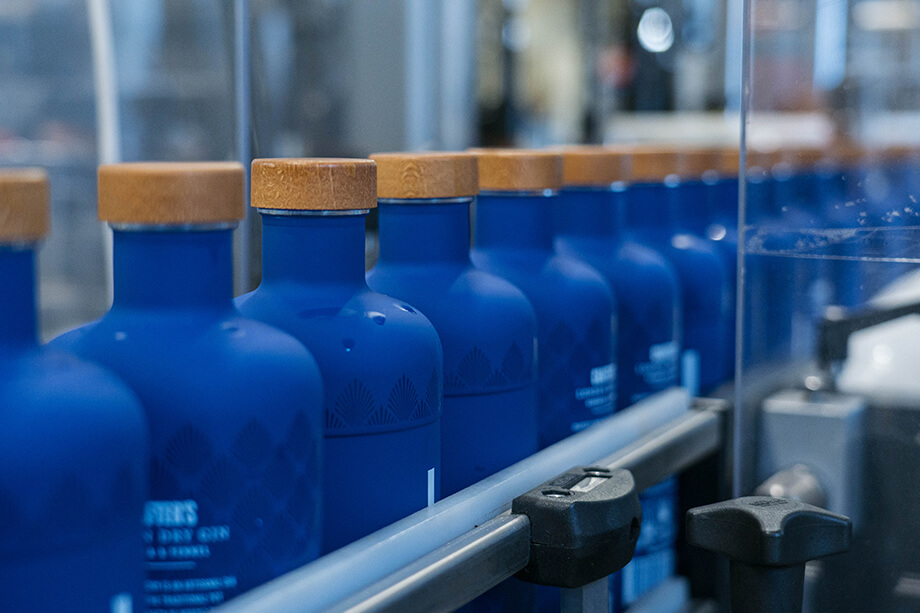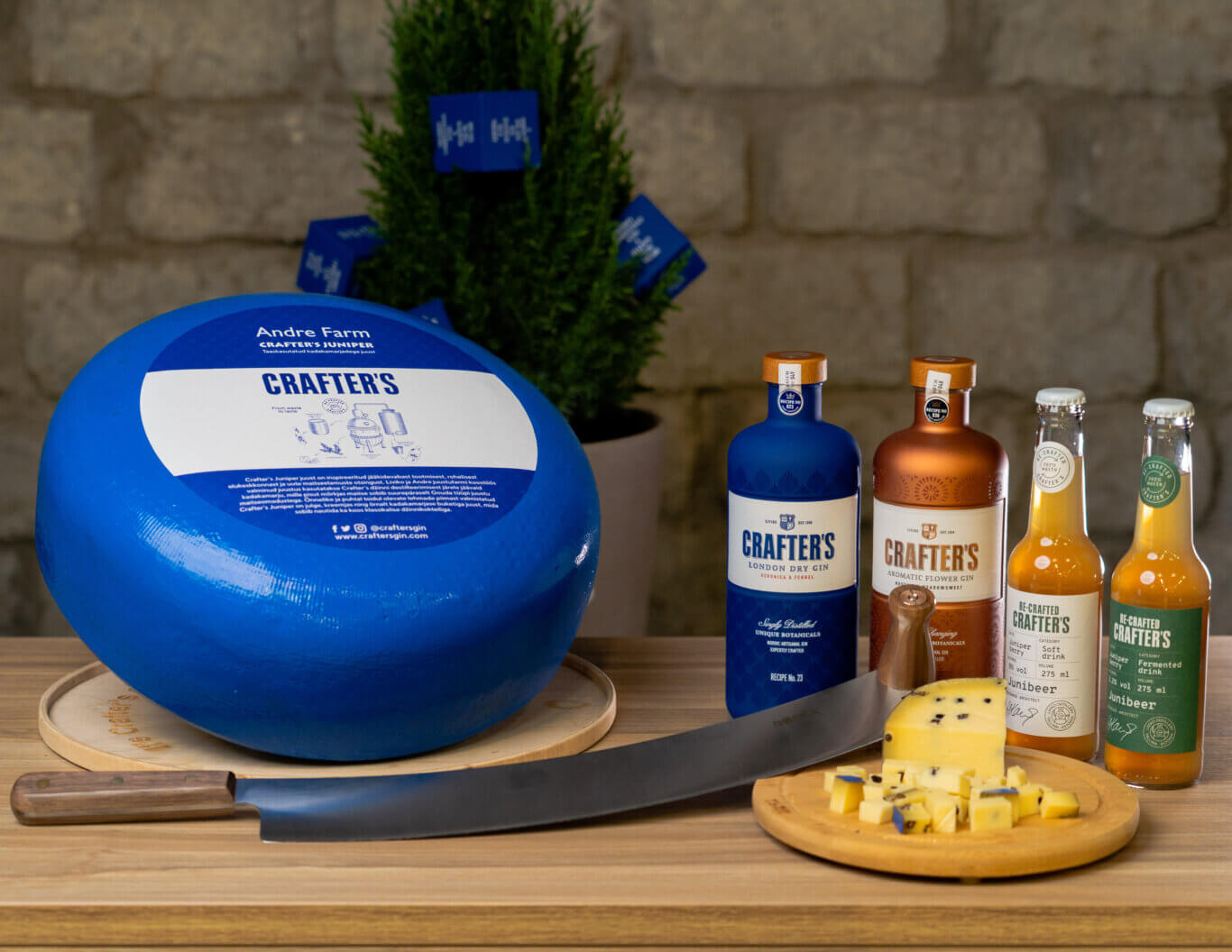Success of Crafter’s gins lays foundation for export of green thinking
The success of Crafter’s gins has given Liviko a novel role – in addition to beverages, green thinking is now being exported to inspire people to use resources more wisely.
A more environmentally conscious journey began with Liviko’s innovative production technology, which uses gin distillation residue as raw material for a new beverage.
Liviko uses juniper berries, the main component of gin, three times as a raw material for new products. The carefully selected juniper berries are first used to make the internationally award winning Crafter’s gins. The beverage crafters then make another drink from the remaining extract of the distillation, either Re-crafted Crafter’s Junibeer, a non-alcoholic effervescent craft beverage, or juniper beer (3.2 vol). The juniper berries remaining after distillation are used to make Crafter’s Juniper cheese.
Beverage architect Hanna Kaur explains: “We have found a way to reuse most of the plant-based ingredients of Crafter’s gins. It used to be a production residue and was all discarded, but now these residues are used to make award-winning drinks!”
The green philosophy was driven by the success of Crafter’s gins
“Thanks to the export success of our classic Crafter’s London Dry and the colour-changing Crafter’s Aromatic Flower gin, we purchased more powerful distillation pots. After running the new equipment for the first time, I tasted the remaining berries and a whole new side of juniper berries opened up to me! Laboratory tests confirmed that the distilled juniper berries are of consistently high quality. This is how we came up with the idea to reuse the valuable juniper berries as a raw material for a new beverage,” Hanna adds.
Juniper berries have been distilled into gin for centuries, but in 2019, the beverage architect Hanna Kaur found an innovative way to reuse these delicious berries and residual extract after distillation.The beverage architect adds that Liviko’s uniqueness as a producer played a major role in the discovery.
“We have long-term experience of distilling gin and making carbonated beverages. Our versatile profile and courage in product development proved to be an important advantage in creating a completely new beverage category, like this junibeer,” Hanna says. As there was no beverage in the world with a similar taste profile or preparation method, Liviko laid the foundation for a completely new category of drink, junibeer, with the new production solution.
Just a few months after the first Re-crafted Crafter’s Junibeer soft drinks were produced, they went straight to the finals of a global innovation competition.
”The use of valuable production residues has been an exciting and delicious journey for us. I am proud to say that in addition to beverages, Liviko now also exports sustainable thinking. I want the word about our innovative re-use of juniper berries to spread,” says Hanna, who has introduced Crafter’s story openly and excitedly at international conferences, fairs and competitions.
Crafter’s designer bottle revamped on environmental considerations

Crafter’s award-winning designer bottle was revamped at the end of 2021. “We wanted to personalise the design of the gin bottle. Its shoulders are now more shapely and Crafter’s name is embossed on the bottom of the bottle. With the new design, we were able to reduce the amount of glass used in the bottle by as much as one-third,” Hanna points out.
Less than a year ago, Liviko transferred the production of gin bottles to the Järvakandi glass factory, which is only 85 km from Liviko. Almost half of the raw material used to produce the bottles is recycled glass. Thanks to the local production of bottles, the reuse of glass and the reduction of glass consumption by one-third, the ecological footprint of the gins decreased significantly. “We are also glad to support a local glass industry with long traditions,” Hanna explains. In addition to Crafter’s bottles, the Järvakandi glass factory makes the Re-crafted Crafter’s bottles, with recycled glass also amounting to half of their raw material.
Every step counts in reducing the ecological footprint
Hanna says: “Our employees can use the bicycles in the Crafter’s bicycle park for work as well as in their free time to enjoy exercise and an environmentally friendly form of transport. Noticing and using new opportunities will lead you to discover new ways to save the environment. We are constantly looking for ways to reshape our operations in a more sustainable way, in terms of resources and the environment.”
Hanna gives another example of how Liviko makes the most of valuable raw materials. “We use plant-based distillation, a rare method in the world, meaning that we distil different parts of each plant separately. Plant-based distillation succeeds in extracting more of the desired flavors from the plants. This results in higher distillation yields and higher distillate quality, while the process actually consumes less energy.”
We have chosen distillation pots made by the German manufacturer Müller, whose product design meets Liviko’s unique plant-based distillation needs, and allows more of the desired flavours to be extracted from the plants through slow distillation. “Smart solutions are meaningful for us. Thanks to the use of residual heat from the distillation boiler and circular washing, it is not necessary to heat water separately to clean the equipment, but it’s the residual heat that heats up the washing water,” Hanna explains how the choice of technology helps reduce the ecological footprint.
Hanna emphasises: “As a beverage producer, we do not make any compromises on the quality of our beverages. Quality is assured by Liviko’s professional team and high-tech laboratory, which thoroughly inspects the raw materials, the production process and the finished product. Love for nature and the environment helps us make environmentally friendly choices every day, which I support with all my heart.”

